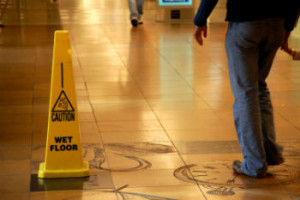
Below you will find a significant Rhode Island Supreme Court decision concerning an accident that occurred in Cumberland, RI. This case note is provided by an East Providence Injury Attorney.
(editors notes: some people say bad facts make bad law. In this Rhode Island premises liability case it does not appear that there was ever a valid personal injury claim worth pursuing to a full trial on the merits.)
Slip and fall resulting in injury
“An ill-fated late afternoon shopping trip to Michaels store in Smithfield led to a fall that resulted in injury to plaintiff. The plaintiff alleged that while placing items she was about to purchase onto the cashier’s counter, her left foot slipped out from under her and she fell to the floor, landing on her left side. After the accident, plaintiff surveyed her surroundings and noticed what she described as a “shiny floor.” The plaintiff experienced immediate pain in her left shoulder, hip, and foot, and emergency personnel brought her to Miriam Hospital by rescue. The plaintiff claimed that as a result of her injuries, she incurred significant medical expenses and suffered physical and emotional trauma.” HABERSHAW v. MICHAELS STORES, INC. 42 A.3d 1273 (2012)
Is a slippery substance required to win a slip claim?
“This case presents us with the question of whether an allegation that a floor was shiny, standing alone, can withstand a challenge to a claim that a plaintiff was injured as a result of a dangerous condition.” Id. ” ….plaintiff alleged that the floor was “shiny,” she admitted that she did not see any slippery substances in or around the area where she fell or, for that matter, anywhere else in the store.”Id. (David Slepkow’s contact form) (Rhode Island Personal Injury & Accident Attorney Settlement Negotiation Tenets)
Hazardous condition required to win a premises liability case
In Habershaw the Rhode Island Supreme Court decided, “there was a complete absence of any evidence upon which the defendant’s negligence could be established.” Id. The Court reasoned: The plaintiff did not testify that her fall was occasioned by any foreign substance on the floor, or that polish or wax had been negligently applied to the floor by defendant. The plaintiff has failed to produce any evidence that would give rise to a reasonable inference that a hazardous condition, created by defendant, existed.” Id.
“The allegation that the floor was shiny, without more, was not “competent evidence” of defendant’s negligence and plaintiff’s allegation is nothing more than “conjecture or speculation.” Santiago v. First Student, Inc., 839 A.2d 550, 552 (R.I.2004) (quoting Skaling v. Aetna Insurance Co., 742 A.2d 282, 288 (R.I.1999)). We reiterate that “the mere occurrence of an accident, without more, does not warrant an inference that a defendant has been negligent.” Id. (quoting Hernandez v. Fernandez, 697 A.2d 1101, 1103 (R.I.1997)).”
Obligations to exercise reasonable care to visitors
“It also is well settled in our jurisprudence that there is an affirmative duty on owners and possessors of property: “to exercise reasonable care for the safety of persons reasonably expected to be on the premises * * * includ[ing] an obligation to protect against the risks of a dangerous condition existing on the premises, provided the landowner knows of, or by the exercise of reasonable care would have discovered, the dangerous condition.” Kurczy v. St. Joseph Veterans Association, Inc., 820 A.2d 929, 935 (R.I.2003) (quoting Tancrelle v. Friendly Ice Cream Corp., 756 A.2d 744, 752 (R.I. 2000)); accord Mead v. Papa Razzi Restaurant, 840 A.2d 1103, 1107 (R.I.2004).” Id.
An unsafe condition that the defendant knew or should have known about is needed
“Although a business invitor is not a guarantor of the safety of those who might be expected on the property, a duty remains to maintain the premises in a reasonably safe condition for prospective business invitees. Terry v. Central Auto Radiators, Inc., 732 A.2d 713, 716 (R.I.1999).” Id. “To recover in a slip-and-fall action such as the case before us here, a plaintiff “must present evidence of an unsafe condition on the premises of which the defendant was aware or should have been aware, and that the condition existed for a long enough time so the owner of the premises should have taken steps to correct [it].” Bromaghim v. Furney, 808 A.2d 615, 617 (R.I.2002) (citing Barone v. Christmas Tree Shop, 767 A.2d 66, 68 (R.I. 2001)).”
